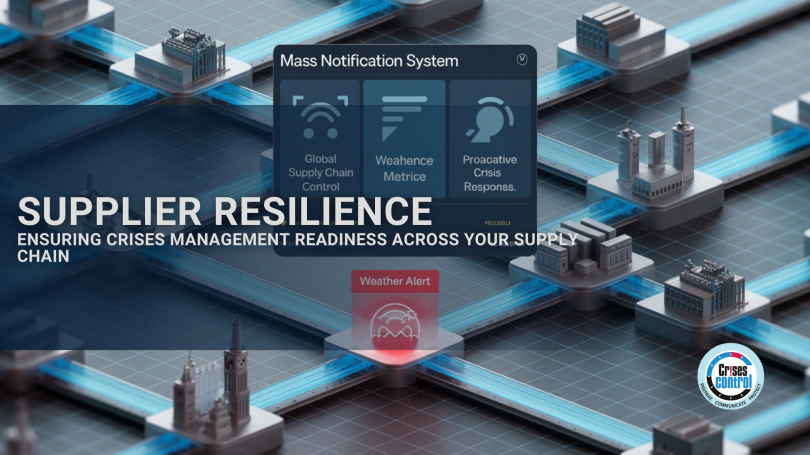It’s no secret that the supply chain is the lifeblood of businesses worldwide. Yet, it’s equally true that it’s one of the most vulnerable aspects of any operation. Suppliers can be impacted by a multitude of crises, and when they suffer, you suffer. Crises management throughout your supply chain is critical. So, what’s the solution? How do you ensure that your supply chain remains robust and agile, capable of weathering the storm when challenges arise? The answer lies in supplier resilience. In this blog, we’ll explore the importance of supplier resilience and how it’s the linchpin to ensuring crises management readiness across your entire supply chain.
Why Supplier Resilience Matters
In an interconnected world, supplier resilience is not just a buzzword; it’s a strategic imperative. Here are some compelling reasons why it matters:
- Ensuring Business Continuity: Your supply chain disruptions can have a domino effect on your business. Ensuring supplier resilience helps maintain business continuity even in the midst of crises.
- Protecting Reputation: Your customers expect reliability. Supplier resilience ensures that you can deliver on promises, safeguarding your brand’s reputation.
- Meeting Regulatory Requirements: Many industries have regulatory requirements related to supply chain resilience. Ensuring compliance keeps your business out of legal trouble.
- Enhancing Customer Trust: A resilient supply chain builds trust with your customers. They know they can count on you, even when the going gets tough.
Building Supplier Resilience
Supplier resilience doesn’t happen by chance; it’s a deliberate strategy. Here are some essential steps to build a resilient supply chain:
- Risk Assessment and Mitigation: Identify potential risks within your supply chain and implement mitigation strategies. This might involve diversifying suppliers, geographically spreading your supply chain, or having backup suppliers in place.
- Communication and Collaboration: Maintain open lines of communication with your suppliers. Establish a collaborative approach to problem-solving to ensure a rapid response when disruptions occur.
- Data Analytics and Technology: Leverage data analytics and technology for real-time insights into your supply chain. Predictive analytics can help identify potential disruptions, allowing you to take proactive measures. Implementing mass notification systems and incident response software can facilitate faster communication and decision-making during crises.
- Supplier Audits and Assessments: Regularly audit and assess your suppliers. Evaluate their resilience strategies, including their own risk assessments and crisis management plans. Identify areas for improvement and work collaboratively to enhance their resilience.
The Power of Mass Notification Systems in Crises Management
Here’s where Mass Notification Systems (MNS) come into play. These sophisticated communication platforms offer a lifeline for businesses striving to fortify their supply chains. With MNS, you can transform your crisis response from reactive to proactive, ensuring that your supply chain remains resilient in the face of adversity.
Rapid Communication
When a crisis unfolds, time is of the essence. Traditional methods of communication, like emails and phone calls, are often too slow and unreliable. MNS, on the other hand, enables rapid communication with all your suppliers simultaneously. Whether it’s a weather-related disruption or a sudden market shift, you can quickly relay vital information, ensuring everyone is on the same page.
Real-time Alerts
MNS provides real-time alerts, keeping your suppliers informed about critical developments. From changes in demand to emergency orders, these alerts enable swift decision-making. With everyone in the loop, you can collectively adapt to changing circumstances, reducing the impact of the crisis.
Two-way Communication
Effective supplier resilience isn’t just about talking to your suppliers; it’s also about listening to them. MNS allows for two-way communication, meaning you can receive updates and information from your suppliers. This bidirectional flow of information fosters collaboration and ensures that you have a complete picture of the situation.
Building Supplier Resilience with MNS
To strengthen supplier resilience, you need to go beyond the basics of Mass Notification Systems. Here are some key strategies:
- Supplier Onboarding: Ensure that all your suppliers are integrated into your MNS. This includes training them on how to use the system effectively.
- Scenario Planning: Collaborate with your suppliers to develop crisis scenarios and responses. By working together on preparedness, you can identify potential weak points and address them proactively.
- Regular Testing: Conduct regular drills and tests of your MNS. This ensures that both your team and your suppliers are familiar with the system and can use it effectively during a real crisis.
Conclusion
In a world where supply chain disruptions can make or break a business, supplier resilience is not an option; it’s a strategic imperative. Mass Notification Systems offer a powerful toolset to fortify your supplier relationships and ensure that your supply chain remains robust, even in the face of adversity. Don’t wait for the next crisis to strike; start building supplier resilience today with the help of MNS. Your business’s continuity and success depend on it.
Ready to strengthen your supplier resilience with Mass Notification Systems? Contact Crises Control today to request a live demo. Your journey to a more resilient supply chain begins here, with Crises Control.
